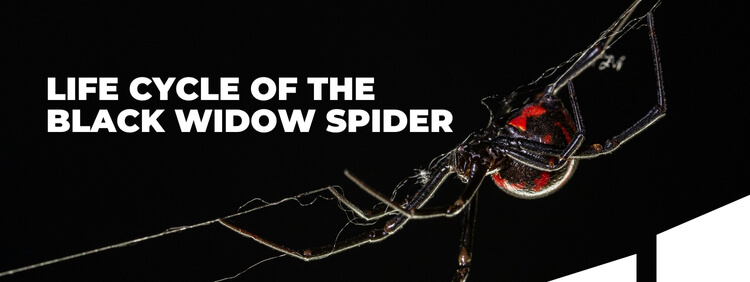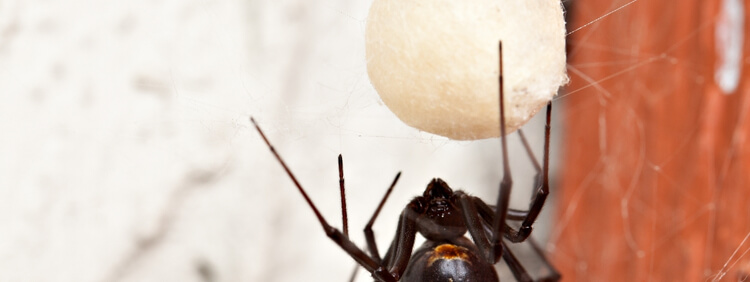 When it comes to maintaining a safe and comfortable home, knowledge is essential. That's why we're here to delve into the intricate life cycle of the black widow spider, a frequent visitor in our houses and backyards.
By understanding their metamorphosis from egg to adulthood, you'll gain valuable research that can help you identify telltale signs of an infestation. But don't worry, this isn't only about the scary stuff. We'll also arm you with practical advice on what to do when you find a black widow spider, and not to forget, the necessary proactive measures for averting and controlling their unworthy visits.
Sure, it may seem like a daunting endeavour at first inspection. Nevertheless, with our step-by-step guide, you’ll feel more confident about taking on these eight-legged intruders. We also want to put emphasis on the importance and advantages of seeking out a pest control expert for spider control and prevention, saving you the stress of a DIY ordeal.
We consider it our mission at Truly Nolen Canada to aid you in navigating through pest control in Waterloo with competence and safety – this isn't a job you have to tackle alone.
So, let's enhance our understanding of our uninvited guests, the black widow spiders, for pursuance towards a spider-free home.
When it comes to maintaining a safe and comfortable home, knowledge is essential. That's why we're here to delve into the intricate life cycle of the black widow spider, a frequent visitor in our houses and backyards.
By understanding their metamorphosis from egg to adulthood, you'll gain valuable research that can help you identify telltale signs of an infestation. But don't worry, this isn't only about the scary stuff. We'll also arm you with practical advice on what to do when you find a black widow spider, and not to forget, the necessary proactive measures for averting and controlling their unworthy visits.
Sure, it may seem like a daunting endeavour at first inspection. Nevertheless, with our step-by-step guide, you’ll feel more confident about taking on these eight-legged intruders. We also want to put emphasis on the importance and advantages of seeking out a pest control expert for spider control and prevention, saving you the stress of a DIY ordeal.
We consider it our mission at Truly Nolen Canada to aid you in navigating through pest control in Waterloo with competence and safety – this isn't a job you have to tackle alone.
So, let's enhance our understanding of our uninvited guests, the black widow spiders, for pursuance towards a spider-free home.
What Stages Does the Life Cycle of a Black Widow Spider Encompass from Egg to Adulthood?
Understanding the life cycle of the notorious black widow spider can be fundamental in identifying their presence and monitoring any potential infestations in your vicinity. This understanding not only aids in our pest control efforts but also generates a deeper insight into the fascinating intricacies of nature. Here are the broad stages of the black widow's life span:- Egg: The life of a black widow spider starts as a round, silken egg sac. A single female can produce numerous sacs, each containing hundreds of eggs.
- Larvae: Upon hatching, the larvae emerge, looking quite different from their parents. They shed their skin, called moulting, as they grow. Juvenile: As the spiderlings moult several times, they begin to acquire the appearance of a mature black widow, though they are still smaller and lighter in colour.
- Adult: After several moulting processes, the spiderlings eventually grow into adult black widows. Females are well known for their black bodies and red hourglass markings, while males are smaller and less conspicuous.
What are the Key Signs of a Black Widow Spider Infestation?
The mere thought of a black widow spider in your home can be quite distressing. It's crucial to be aware of the telltale signs of an infestation, in order to promptly contact our trusted pest control experts. Identifying a black widow spider isn't always as straightforward as you may think.- Presence of Distinct Webs: Black widow spiders craft irregular, messy webs, unlike the symmetrical masterpieces of other spiders. These webs are often found near ground level and in dark, secluded areas.
- Sightings of the Spiders: An actual sighting of a black widow spider, which is black with a recognizable red hourglass shape on its abdomen, is a glaring sign of infestation. However, only the female is dangerous to humans.
- Spider Egg Sacs: Each egg sac is a signal that you could have a growing black widow population. They look like small, white, silk round balls, and each can contain hundreds of baby spiders.
- Bite Marks: Black widow bites are a clear indication of an infestation. They cause severe pain and other symptoms such as nausea, abdominal pain, and difficulty breathing.
What are the Potential Dangers of a Black Widow Spider Infestation?
Understanding the potential dangers associated with a black widow spider infestation can play a key role in emphasizing the importance of early detection and pest control. The most notorious in the spider world, black widow spiders possess a highly venomous bite that can cause significant health issues. Here are the key dangers that should prompt you to act swiftly at the first sign of an infestation:- Highly Venomous Bites: Black widow spiders are known for their potent venom, which is more toxic than that of a rattlesnake. Although they're less aggressive and their small fangs can't deliver as much venom, a single bite can cause severe reactions in humans.
- Adverse Health Reactions: Symptoms of a black widow bite often include muscle pain, cramping, abdominal pain, excessive sweating, and uneven heartbeat. It's important to seek immediate medical attention if bitten.
- Problems for Pets: This risk is not just limited to humans. Pets, especially dogs and cats, are also susceptible to black widow bites, leading to similar adverse health effects and in severe cases, can be fatal.
- Spider Populations Multiply Quickly: Female black widows can lay hundreds of eggs in one sac, leading to a fast and uncontrollable spike in the spider population. This turns a small problem into a potential infestation that requires fast action and robust pest control in Waterloo.
What Steps Should You Take Upon Discovering a Black Widow Spider?
 Discovering a black widow spider in your home can be a bit of a scare due to the infamy surrounding these creatures. But don't let fear cloud your judgment. Here are the necessary steps to take upon encountering a black widow spider:
Discovering a black widow spider in your home can be a bit of a scare due to the infamy surrounding these creatures. But don't let fear cloud your judgment. Here are the necessary steps to take upon encountering a black widow spider:
- Don't Panic: While the black widow is indeed venomous, they usually only bite when they feel threatened. Maintain a safe distance and take the time to observe its characteristics to confirm it's a black widow. This experience will give you insights on how to identify a black widow spider in the future.
- Document the Scene: If possible, take a photograph of the spider and its location. Keep track of where you spotted them as it might signify a larger infestation.
- Minimize Contact: Avoid handling the spider as it can provoke defensive behaviour. Remember, your safety comes first.
- Contact an Expert: Once you establish that you have a black widow, it's best to contact a pest control professional. Dealing with venomous spiders isn't a do-it-yourself project, especially if you lack the necessary knowledge and skills.
What are the Most Effective Methods for Preventing and Controlling Black Widow Infestations?
Now that we understand the life cycle of a black widow spider and the potential dangers they pose, let's address the question of prevention and control of these menacing pests.- Regular Cleaning: Regular cleaning and decluttering are critical to keep spiders away. By minimizing their potential hideouts like piles of wood, rocks, and junk, you can make your home less inviting.
- Seal Cracks and Openings: Tiny cracks and openings are perfect entry points for spiders. Sealing such points around your home can effectively discourage their intrusion.
- Use of Insecticides: Professional application of insecticides can also serve as a barrier. However, this method must be performed by experts to ensure safety and effectiveness.
- Professional Pest Control: This possibly is the best recourse when dealing with a black widow infestation. Getting in touch with pest control experts results in a thorough inspection and effective eradication plan.
What are the Benefits of Hiring a Pest Control Expert for Spider Control and Prevention?
When dealing with something as dangerous as a black widow infestation, it's crucial that you take all available precautions. The best course of action is often to enlist the services of an expert who specializes in pest control. There are many distinct advantages of having such a professional handle your spider concerns:- Experience and Knowledge: Pest control experts are well-rounded in dealing with various types of pests, including black widow spiders. They possess the understanding and know-how to effectively identify, control, and prevent infestations.
- Extensive Training: These professionals undergo rigorous training that equips them to manage infestations efficiently and safely, ensuring your family and pets aren't put at risk during the process.
- Focus on Prevention: Aside from tackling the existing concern, pest control experts also employ strategies for future prevention, reducing the chances of recurring infestations. They can pinpoint potential hiding spots and close avenues that could allow spiders to invade your home in the future.
- Time-Efficiency: In contrast to the DIY techniques you might experiment with, a pest control expert can quickly determine what to do when you find a black widow spider, saving you valuable time and effort.
- Cost-Effective: While there's an initial investment involved, hiring a professional for pest control, in the long run, may save you from costly damages that pests can cause to your property, making it a cost-effective solution.

